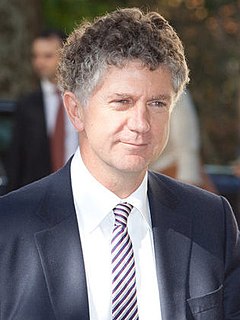A Quote by Wendell Berry
We seem to know that international wars tend not to stop with their formal "peace treaties." We seem not to have thought enough about the difference between the large official events of political and military history and their overflow both into recognized effects and into the lives of unofficial people who suffer them.
Related Quotes
I've noticed that girls between like 20 and 30 seem to know 'Can't Hardly Wait.' I got the goth kids who know 'Buffy.' I got this wide spectrum of people who range from like 8 to 13 who seem to know 'Scooby-Doo.' Then I get the international people who seem to know 'Austin Powers' and 'The Italian Job.'
I've noticed that girls between like 20 and 30 seem to know 'Can't Hardly Wait.' I got the goth kids who know 'Buffy.' I got this wide spectrum of people who range from like 8 to 13 who seem to know 'Scooby-Doo.' Then I get the international people who seem to know 'Austin Powers' and 'The Italian Job.
Just as an informal, nonscientific observation, most people's personalities don't seem to change very much during their lives. There are exceptions in the case of people who go through hugely traumatic events or suffer from brain injury or disease. Some would argue that religious conversions can have deep personality-altering effects. But these are all exceptions to the rule.
African-Americans were dispossessed of the land by being brought over here in slave ships, whereas Indians were on the land and fought literally wars against Europeans for control of that land. And that history of dispossession, you know, if you look at the treaties, it's very interesting. Everyone thinks that Indians were ripped off in their treaties. If you look at the first round of treaties from about 1800 to the Civil War, tribes secured over 150 million acres. I think it may have been 144 million acres in those treaties. That's a large amount of real estate.
The problem, of course, was that people did not seem to understand the difference between right and wrong. They needed to be reminded about this, because if you left it to them to work out for themselves, they would never bother. They would just find out what was best for them, and then they would call that the right thing. That's how most people thought.
The difference between ignorant and educated people is that the latter know more facts. But that has nothing to do with whether they are stupid or intelligent. The difference between stupid and intelligent people-and this is true whether or not they are well-educated-is that intelligent people can handle subtlety. They are not baffled by ambiguous or even contradictory situations-in fact, they expect them and are apt to become suspicious when things seem overly straightforward.
I'm pretty good at inventing phrases - you know, the sort of words that suddenly make you jump, almost as though you'd sat on a pin, they seem so new and exciting even though they're about something hypnopaedically* obvious. But that doesn't seem enough. It's not enough for the phrases to be good; what you make with them ought to be good too.
When the war (WWI) finally ended it was necessary for both sides to maintain, indeed even to inflate, the myth of sacrifice so that the whole affair would not be seen for what it was: a meaningless waste of millions of lives. Logically, if the flower of youth had been cut down in Flanders, the survivors were not the flower: the dead were superior to the traumatized living. In this way, the virtual destruction of a generation further increased the distance between the old and the young, between the official and the unofficial.






































